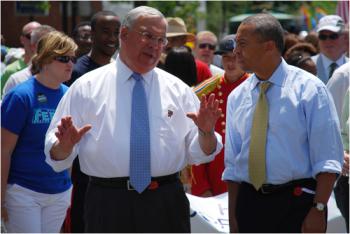May 30, 2013
 Mayor Tom Menino chatted with Gov. Deval Patrick at the start of the Dorchester Day Parade in 2010. Photo by Chris Lovett
Mayor Tom Menino chatted with Gov. Deval Patrick at the start of the Dorchester Day Parade in 2010. Photo by Chris Lovett
Dorchester Park. The Henderson School. The Strand Theatre. Those were some of the places that came to mind on Tuesday for Mayor Thomas Menino when he sat down for a brief interview with the Reporter to talk about his legacy in Dorchester.
“I look at Dorchester as an integral part of Boston in my years as mayor,” Menino said after a luncheon honoring the Boston Public Schools’ top graduates at the Boston Harbor Hotel. “The real strength of Dorchester is its people, and how they get involved. They’re on top of the issues, they know the issues,” he said.
Menino, who is not seeking a sixth four-year term, has family ties to the city’s largest neighborhood: “My daughter lives in Dorchester,” he said, referring to Susan, before saying its name again, with emphasis on the local pronounciation: “Daw-chestah.”
Asked about his Dorchester legacy, Menino said he “took a lot of pride” in the establishment of the Henderson Inclusion Elementary School on Dorchester Avenue. The school, named after William Henderson, a retired principal who is blind, is well-known for its diversity and having disabled and non-disabled students working together in the same classroom. Twenty-seven percent of the 244 children who attend the Henderson are special education students. Last year, state education officials dubbed it a “Commendation School,” citing its increased student achievement.
Menino also noted that the number of Main Streets programs, which provide technical assistance to local businesses, has also increased under his tenure, from about five to twenty. Dorchester neighborhoods that have a Main Streets program include Bowdoin Geneva, Fields Corner, Four Corners, Grove Hall, St. Mark’s and Uphams Corner.
His administration has also poured millions into the Strand Theatre in Uphams Corner, which the city took over in 2004. It was dirty and in disrepair, Menino said, and now the building, which opened in 1918, is in a better condition. “Things are happening there,” he added.
As for the parks, like 122-year-old Dorchester Park, they are “in better shape than they’ve ever been,” said the mayor, who helped the park receive a “historic landmark” status.
Menino, who missed the annual observance of Memorial Day at Cedar Grove Cemetery on Monday, will also miss next Sunday’s Dorchester Day Parade because of ongoing health issues. He is scheduled to have surgery tomorrow for an enlarged prostate after which he will stay in the hospital for several days before heading back to the Parkman House on Beacon Hill, where he has recovered from other ailments.
Asked if there is anything he’ll miss about the parade, Menino mentioned the meatloaf dinner the parade committee holds annually to raise funds for the march. “The meatloaf dinner is a great tradition for the Dorchester Day parade. It was great meatloaf, it came out of Gerard’s,” he said. One year, he noted, organizers changed the menu from meatloaf to chicken, and “I complained.” The next year, the meatloaf was back.
Menino said he has fond memories of marching with his wife, Angela, in the Dorchester Day Parade, noting the display of diversity along the 3-mile route up Dorchester Avenue. It often feels like walking through the “League of Nations,” he said, with people and families from Ireland, Vietnam, Germany, and Poland, lining the sidewalks. “It’s what Boston’s all about,” the mayor said, “The diversity all along that parade route really represents Boston.”


